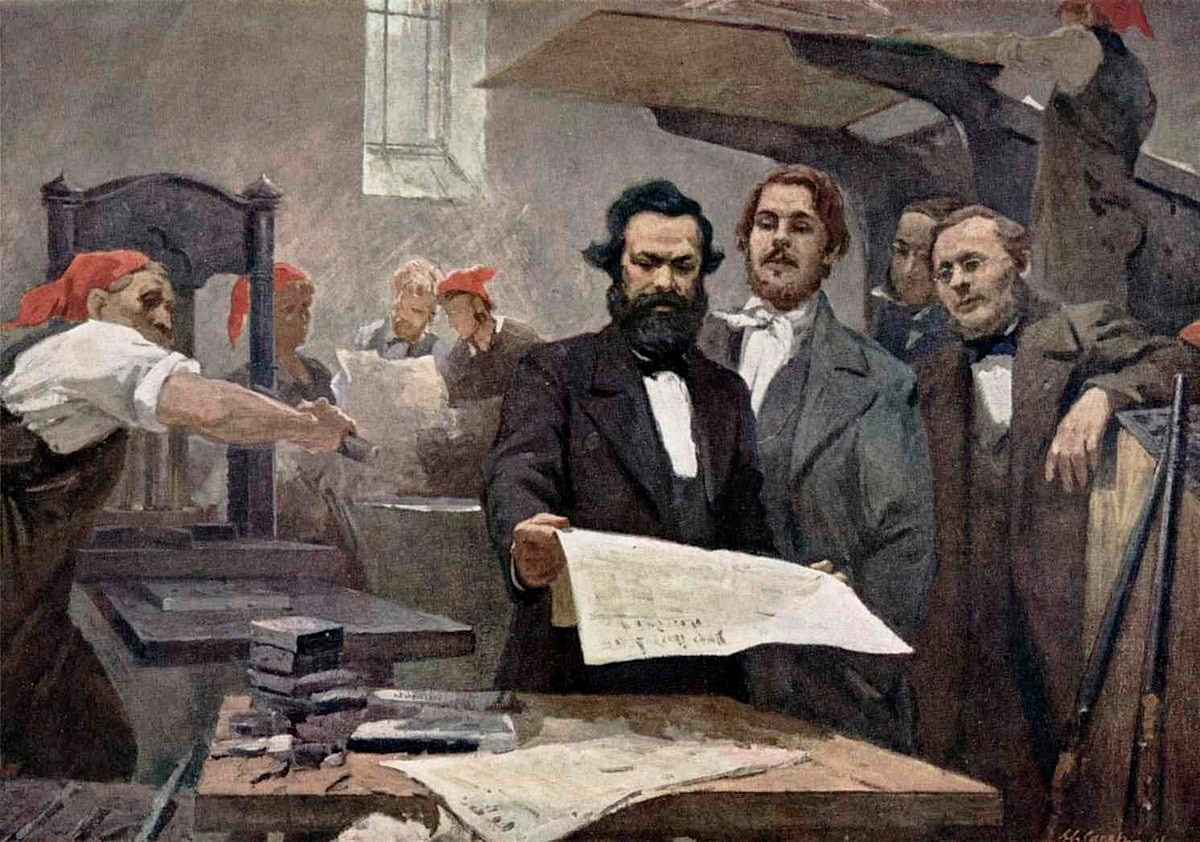更多語言
更多操作

馬克思主義是由卡爾·馬克思和Friedrich Engels創立的科學世界觀與思想流派。馬克思主義發展起來的理論基礎是法國空想社會主義、英國政治經濟學和德國古典哲學的批判性結合。 自19世紀以來,馬克思主義發展成幾種不同的流派,如馬克思列寧主義、毛澤東思想、胡志明思想等許多流派。馬克思主義科學世界觀是通過基於歷史唯物主義的社會和歷史發展研究形成的。馬克思主義科學世界觀是通過基於歷史唯物主義方法對社會和歷史發展的研究形成的。
馬克思和恩格斯首先在與空想社會主義者鬥爭時發展了科學社會主義,《資本論》第一卷的發行使其發展更進一步。列寧在二十世紀實現了無產階級專政。
歷史
馬克思、恩格斯批判地重新思考和創造性地改造了人類以往科學思想和社會發展的成果,總結了工人群眾階級鬥爭和革命運動的經驗。
馬克思主義是一個完整的理論體系,是在各國工人運動和革命鬥爭的實踐中,在與各種錯誤思想路線的鬥爭中,在時代發展提出的新問題、新考驗進行創造性研究的過程中發展起來的。
馬克思和恩格斯辭世後,繼任者們繼續推動馬克思主義向前發展。列寧把馬克思主義同俄國革命的具體實踐結合起來,創造性地發展了馬克思主義,提出了帝國主義理論。他發展了馬恩關於無產階級革命和無產階級專政的理論,提出了建立新型無產階級政黨的理論。他總結了蘇維埃俄的實際經驗,提出了社會主義建設的基本原則和指導理論。列寧對馬克思主義的發展,將馬克思主義帶到了一個新的階段,即列寧主義。
俄國革命與蘇聯的建立
隨着1917年十月革命的爆發,布爾什維克從俄國臨時政府手中奪取了政權。布爾什維克建立了第一個以蘇維埃民主和列寧主義思想為基礎的社會主義國家。布爾什維克承諾退出第一次世界大戰,並建立一個無產階級專政國家。十月革命後,蘇維埃政府捲入了與白軍的戰爭。這一時期的特點是許多社會主義政策的確立和主要以馬克思列寧主義形式出現的新的社會主義思想的發展。
1919年,新生的蘇維埃政府建立了共產主義學院和馬克思-恩格斯-列寧研究所,進行馬克思主義的理論研究,並為俄國共產黨出版官方的思想研究文獻。隨着列寧於1924年去世,蘇聯共產主義運動中出現了內部鬥爭,主要是約瑟夫·斯大林和列夫·托洛茨基之間分別以右翼反對派和左翼反對派的形式進行鬥爭。這些鬥爭是基於雙方對馬克思列寧主義理論的不同解釋,這些解釋都是基於當時蘇聯國情的。
中國革命
在抗日戰爭更第二次世界大戰結束後,中國無產階級革命再次爆發。毛澤東領導的中國共產黨,把馬克思主義基本原理與中國國情相結合,創立了毛澤東思想。中華人民共和國於1949年宣布成立。
20世紀下半葉
1959年,古巴革命爆發,菲德爾·卡斯特羅的七二六運動勝利。雖然不是明確的社會主義革命,但卡斯特羅在勝利後升任總理,並採用了列寧主義發展模式,與蘇聯結成了聯盟。
21st century
At the turn of the 21st century, China, Cuba, Laos, North Korea and Vietnam remained the only officially Marxist–Leninist states remaining, although a Maoist government led by Prachanda was elected into power in Nepal in 2008 following a long guerrilla struggle.
The early 21st century also saw the election of socialist governments in several Latin American nations, in what has come to be known as the "pink tide". Dominated by the Venezuelan government of Hugo Chávez, this trend also saw the election of Evo Morales in Bolivia, Rafael Correa in Ecuador and Daniel Ortega in Nicaragua. Forging political and economic alliances through international organizations like the Bolivarian Alliance for the Americas, these socialist governments allied themselves with Marxist–Leninist Cuba and although none of them espoused a Leninist path directly, most admitted to being significantly influenced by Marxist theory.
At an event celebrating the 200th anniversary of Marx's birth, Xi said "We must win the advantages, win the initiative, and win the future. We must continuously improve the ability to use Marxism to analyze and solve practical problems", adding that Marxism is a "powerful ideological weapon for us to understand the world, grasp the law, seek the truth, and change the world". Xi has further stressed the importance of examining and continuing the tradition of the CPC and embrace its revolutionary past. struggle and revolutionary movement of the working masses.
The most important theoretical sources of Marxism were classical German philosophy, English political economy and French utopian socialism. Marxism took a fundamentally new approach to solving practical and theoretical problems and gave a scientific answer to the main questions posed by the course of social development and, above all, by the development of capitalism and the labor movement; it overcame the idealism and anti-historical, contemplative nature typical of previous social thought.
Theory
Marx famously states in the Communist Manifesto:
The theory of Communists may be summed up in the single sentence: Abolition of private property.[1]
Marxist theory can be divided into three parts, each part deriving from a different period of his life: Marxist Philosophy, inspired by German Philosophy, Marxist Political Theory, inspired by French Socialism, and Marxian Economics, inspired by English Political Economy.[2]
Philosophy
Marxist philosophy is a materialist philosophy, and it is principally concerned with Dialectical materialism, and Historical materialism. Marx was originally a Hegelian scholar and was often associated with the Young Hegelians, a group of radical Hegelian philosophers in Germany at the time. Like many other Young Hegelians, he distanced himself from them but his philosophy continued to use the same foundation.[2]
Politics
Marxist political thought is his by far Marx's most famous legacy. Marx was initially persuaded by the views of French Socialists such as Robert Owen, Henri Saint-Simon and Charles Fourier.[2] He later rejected their theories, denouncing it as Utopian socialism with no theoretical basis, proposing Scientific Socialism instead.
Economics
Marxist political economy is an application of his philosophy to capitalist economies. His theories were inspired by the British Political Economists Adam Smith and David Ricardo.[2] He showed how capitalism can be analyzed through its own contradictions, beginning in Capital with the commodity.
